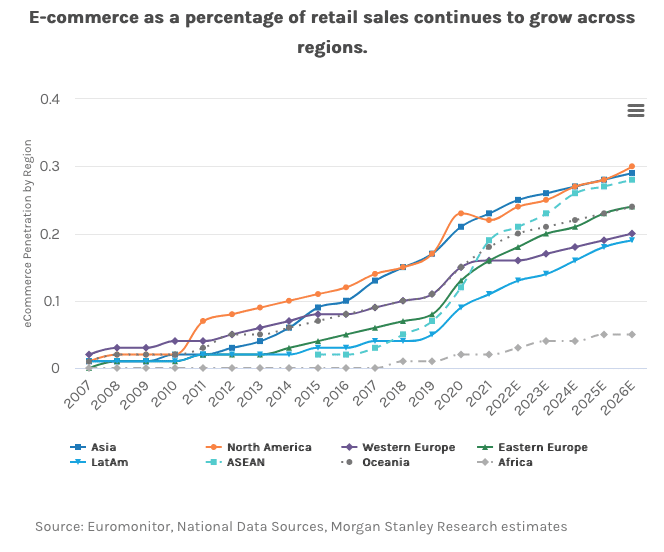There is no time to worry about presenting a potentially bleak or vain hypothesis, only a search for what is unavoidable in the future. On the surface, this may sound like run-of-the-mill consumer thinking, but the trend of “hyper individualisation” sits at the precipice of a few converging trends.
- Millennials/GenZ stand to inherit trillions in wealth
- The line between content creator & consumer is increasingly blurred by the day, the phones in our pockets enabling this convergence
- Diet drugs may make it so anyone can be as thin as they want
- AI seems like it will enable increasingly personalised experiences
- Perhaps until the point where our lives are so tailored to who we are, there’s less of a “shared reality” than at any point in living memory
Beauty, Cosmetics, Luxury, Travel, Plastic Surgery, House Refurbishing & Upgrades, Tutors & Custom Education, Financial Services, etc. are all industries that should benefit from this trend in one way or another.

The idea that our phones are not just cameras, but mirrors as well, is nothing new, and the recent surge in “influencers” has been around about as long as Instagram has been a popular app. As the veil of celebrity came down, the value of celebrity increased. We felt closer than ever to our favourite artists, athletes, and movie stars as we saw their lives presented by Instagram’s feed. Then came Snapchat stories. YouTubers and Twitch streamers were emerging with huge, dedicated followings.
The ability to convert engagement to dollars drives some interesting trends and is at the core of what we mean when discussing hyper-individualisation. We don’t just have avatars and profiles online; we have a digital self. And clever marketing use of managing this data can achieve phenomenal returns and success.
And like any mega trend, those who have “cracked the code,” so to speak, on how to monetise each consumer’s digital selves can not only enjoy the monetary fruits of their labour but are also empowered by the freedom they find from essentially mesmerised in their loyalty to these brands, assuming they can offer enough to support their lifestyle.
Hyper-personalisation and self-obsession
In the Instagram era, being fit and looking good was a status symbol. It certainly still will be, but the difference is now you can pay to be skinny. And at the risk of being vain, looking good feels good. You want to go out more. You want to try on new clothes. You may even be more inclined to use dating apps. Going to the gym and eating healthy may be more rewarding as you perceive yourself in ever greater detail. Providing it supports cognitive dissonance in our consumer behaviour.
So we have everyone wanting to be hot, and there is a pharmaceutical aid to assist in part of the process, which may or may not make one more likely to be more actively engaged online. That’s one part. But this role seamlessly into many other aspects of consumerism and ecommerce, including luxury, beauty and travel,
Individualism for ecommerce email
The only real risk to applications used for consumer individualisation in the near to mid-term is wrapped up in conflicting visions. The companies implementing tech nouse, for the most part, have pristine balance sheets, and healthy margins and can implement AI personalisation technology from some of the most brilliant people on the planet. In an era of hyper-personalisation, companies with all the data should thrive, assuming of course they can capitalise on the trend.
It’s kind of a basket of greed. The more wealthy consumers will want the best of everything (as has always been the case) but can see this accelerating as life can increasingly be optimised & personalised down to the minutiae because every moment is an opportunity when perceived from the retailer’s view.
So what about personalization? With AI-enabled hyper-personalisation across various niches, everyone with the necessary means is enabled to strive to live a life that’s, in some senses, hyper-optimised and in a world where products and services are fighting to cater a unique experience to each individual, hyper-personalised.
The feedback loop of data tracking and iteration based on results will not so much as create a plan that is hyper-personalised to the individual, but it is almost a living, breathing phenomenon that just happens around them – in the cloud so to speak. It might go so far as to plug in with their grocery apps, ordering a set nutrition plan at predefined intervals each week, further personalising the client’s life. (who may or may not have ambitions of getting fit and helping with the diet and posting luxury fits from dream destinations on their social media, who knows?
The opportunity for capital to flow to retailers with the greatest individualisation, of the best online product content presented to each individual, at the most applicable time. This can only be done by email, as the chances of that person being on the site at the right time are otherwise impossible to predict. The returns will smash holes in previously known targets of CLV achieved.
Maybe a relevant analogy for this overall trend is private banking services. At a certain level of wealth, it is worth the bank’s time to hyper-personalise a wealth management strategy for their clients. In the future when nearly everyone is online, wealthy folks or maybe more academically, folks whose propensity to consume becomes less cyclical, will have access to hyper-personalised offerings from all sorts of companies. If in the past people wanted to wear the same outfit as their favourite actress or model, they now may want to wear a new outfit every day like their favourite influencer.
One of the most powerful ideas/ forces in capital markets is information asymmetry. We’re talking about how, as Thiel described, “the best startups have secrets” idea.
Conclusion
So what will the world look like in this hyper-individualised future where many seek internet clout and further, as many seek to convert consumer individuality into real-world ecommerce currency?
Well with grocery, fashion, wine, beauty, health, luxury, travel etc, all able to be personalised it could maybe get a little weird. Life could become so tailored to just you it’s difficult to relate to the realities of other’s experiences. As wealth gets transferred to a generation with new mimetic desires, consumption habits and hyper-personalisation converge.
Companies will have increasing amounts of data for each of their consumers, which they will feed into increasingly powerful AI models to tailor increasingly personalised experiences.





